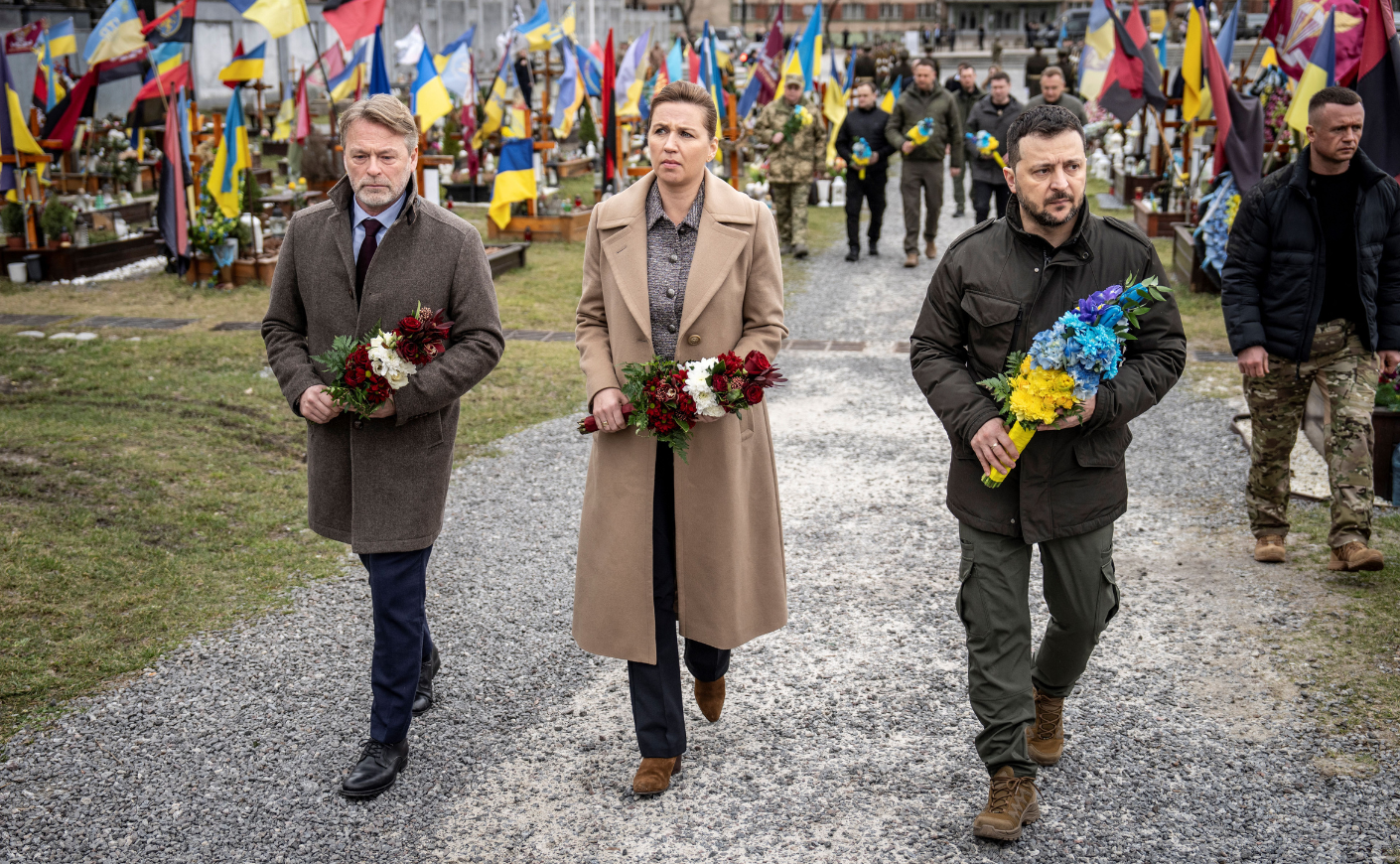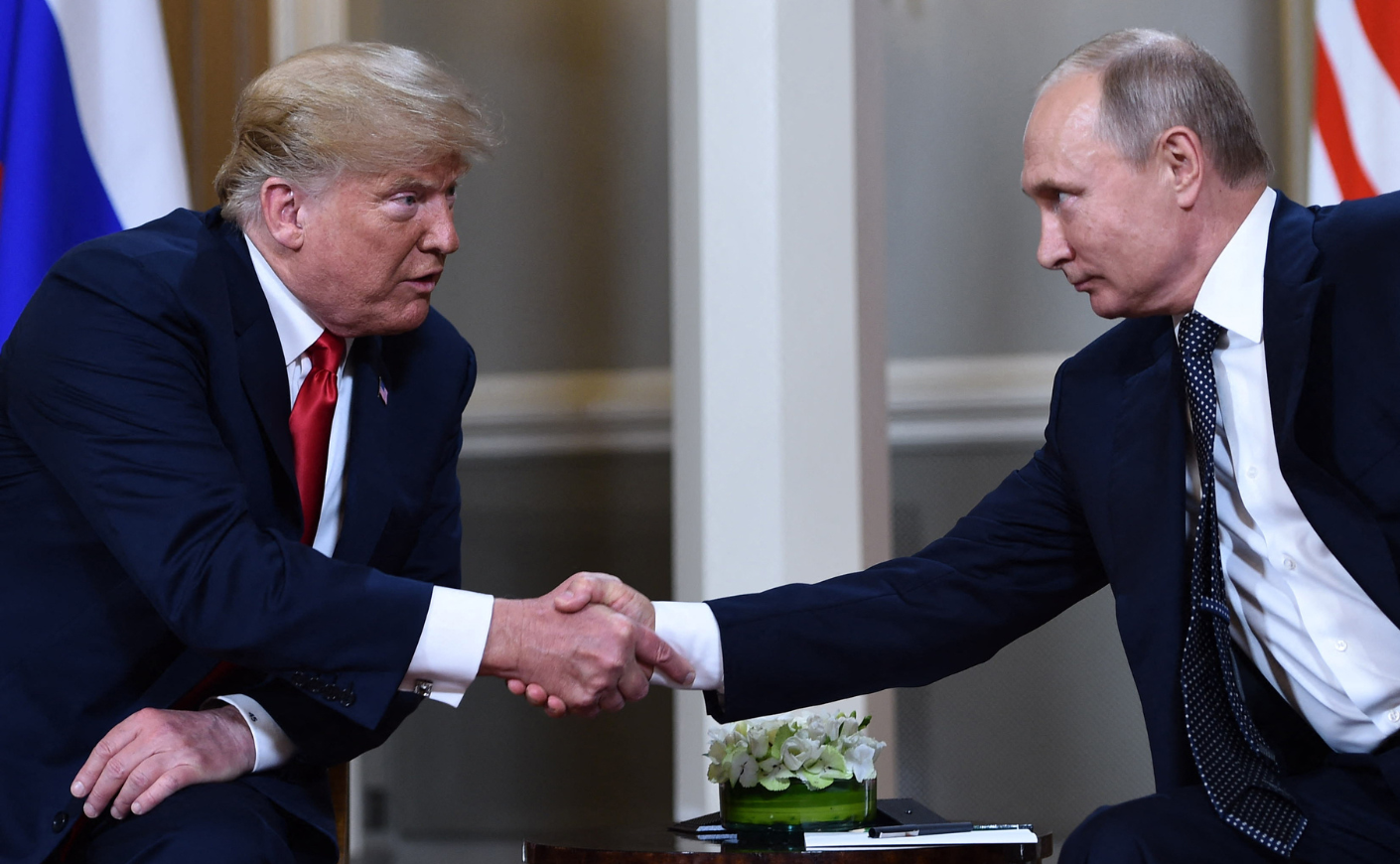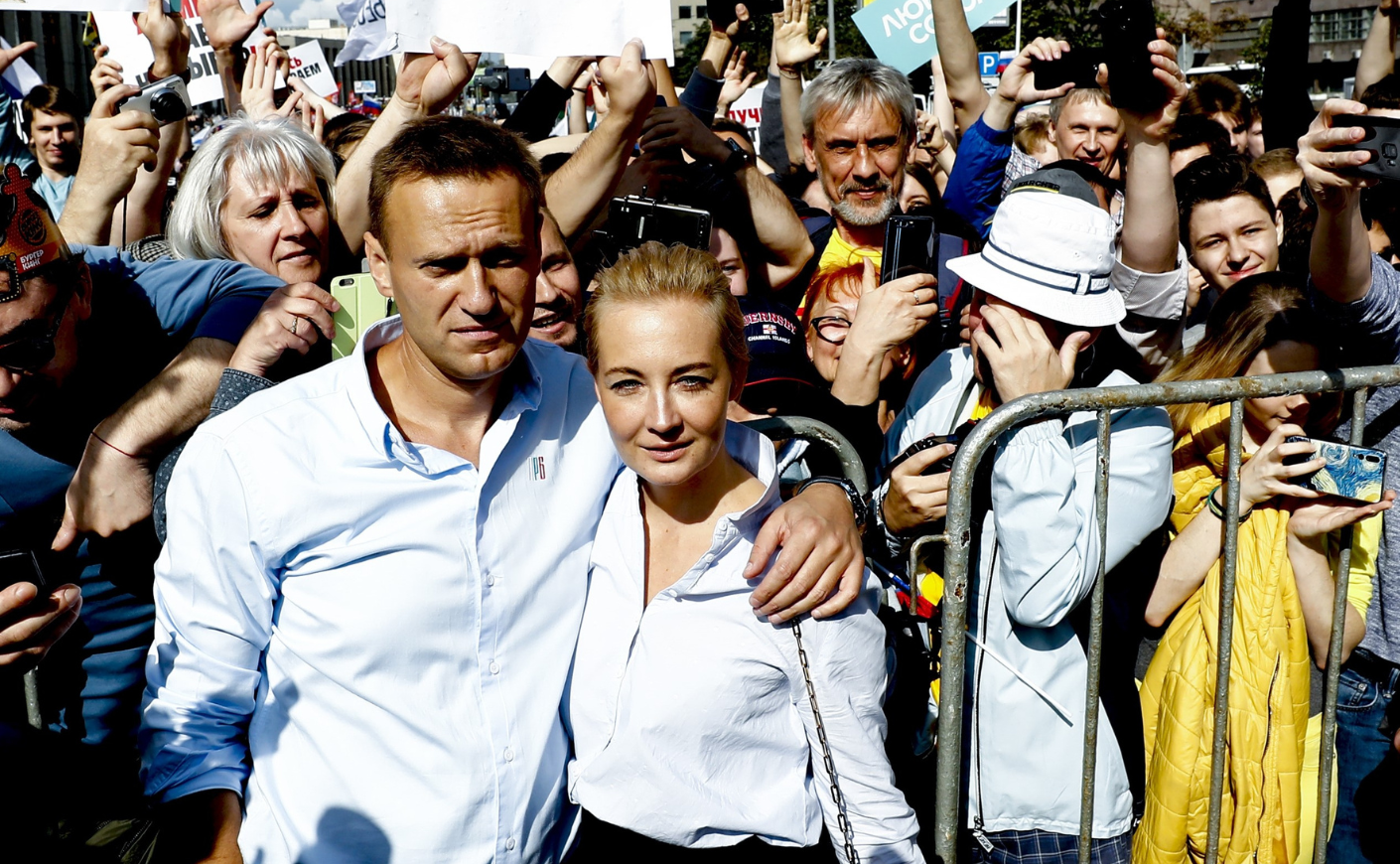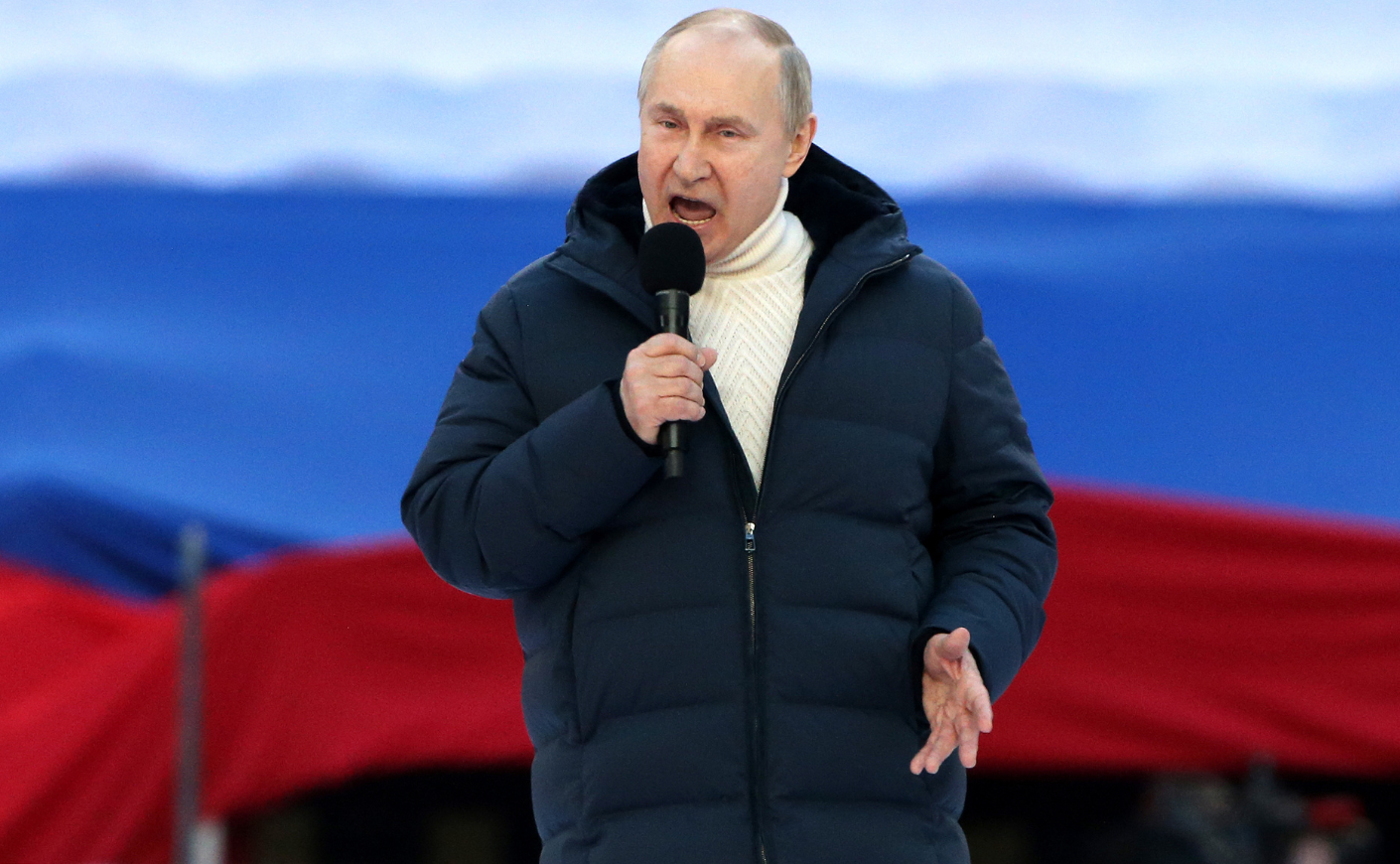Julia Ioffe is a founding partner and Washington correspondent for Puck News, where she covers national security, foreign relations, and domestic politics from Washington and Europe. She’s recently returned from the annual Munich Security Conference, where heads of state, intelligence chiefs, defense ministers, and foreign secretaries gather to discuss the state of the world. Now, at the start of the conference, as many of you know, we learned the devastating news that longtime Russian resistance leader Alexei Navalny had died in a Russian prison.
We’ll be speaking about that tragic event and its implications. But first, we’ll start with where things stand in the Russia-Ukraine war as we mark its second anniversary.
Katie Couric: As The New York Times describes it, Ukraine is now on the defensive along the entire 600-mile front, is fighting with dwindling ammunition and faces deep uncertainty over the future of military and financial aid from its most important ally, the United States. Julia, I know you write that you witnessed a great deal of anger and exasperation from the Europeans directed at the U.S. for being such a wildly unreliable and volatile ally. Talk about this sentiment and the perception of the U.S. by our NATO allies, and the larger world at this moment in time.
Well, it’s interesting — last year when I was at Munich, people were worried. They were wondering how long the U.S.’s will to defend Ukraine would last. What would happen if Trump came within striking distance of the White House? All these what-ifs. People were worried last year, and this year, I think they were just fed up.
They were fed up with having to worry about our domestic politics, throwing things that are so essential to the West’s role in the world into total disarray.
And just hearing officials publicly say, “NATO’s very important for the U.S., the U.S. needs NATO. The only time that NATO’s Article Five — the mutual defense pact — was ever invoked, was on behalf of the U.S. on 9/11. In fact, the only time NATO ever fought as a coalition was in Afghanistan, in defense of the U.S. after the 9/11 terrorist attack. And then the cameras go off, and the meeting ends and people are like, “I can’t believe we have to keep explaining this to them.”

I’d love for you to explain the complaint that many NATO countries aren’t “paying their fair share.” Can you put that in perspective for us? Because that, of course, is Donald Trump’s whole argument, in terms of not supporting these countries.
So there’s a floor that was introduced — a 2 percent GDP floor on defense spending. And it was President Obama who pushed NATO’s allies to contribute more to the collective defense so that it wasn’t just that Europe could spend their money on wonderful health care while we spend our money on defending Europe.
And since then, and since Vladimir Putin invaded, a lot of allies have upped their defense spending, and some are spending more than 2 percent, especially the ones that they feel to be most at risk of Russian aggression, like the Baltic countries or the Eastern European countries. So it’s not Donald Trump who is making them do that, but Vladimir Putin, ironically, because they realized they do need to step up.
What do they make of the rhetoric coming from the Trump campaign? Not only about NATO countries when they are providing foreign aid, but this notion that Russia can do whatever the hell it wants.
So I think they are frustrated that it’s framed as something that’s only good for Europe. [As if]we don’t need it [and] we’re just doing it out of the goodness of our hearts for Europe. And therefore they have to pay us back, or we have to treat it the way Donald Trump was talking about it as a protection racket. I mean, he was talking about NATO basically as a mobster would talk about a protection racket. And again, I think this is why people were saying, “Hey, remember the only time NATO’s ever actually banded together to fight to defend one of its members was to defend you guys.”
I was talking to a former very high-ranking CIA officer who was manning an outpost in eastern Afghanistan fighting with the Taliban and the people. He was saying the people who were providing U.S. air cover weren’t the Americans, it was the French. And they lost almost 100 people in Afghanistan. And I don’t see them sending us a bill. We tend to forget what’s done for us, and only remember what we do for others. And that’s just not a good look on a human level, let alone on a national level.
Julia, I wonder if you could play history professor for a moment and talk about the raison d’etre for NATO — the inception of NATO, why it was created, and to what end?
It was created during the Cold War, after World War II, to hold back Soviet expansionism and aggression. It is a defensive, rather than an offensive alliance. And the idea was to deter the Soviet Union from attacking any one of NATO’s members, because the idea was, “If you come for France, for example, you’ll also be fighting the U.S. So don’t even think about it.”
And it worked — it was a very effective deterrent. The thing is that, when you have people saying it’s all about money, it makes our allies start to look elsewhere. And we need those allies as much as they need us. I think Americans there are a lot of Americans who don’t understand the cost of being a superpower.
And they don’t want to pay that cost, but they still want to be the superpower. Like, “We want our Social Security, but we don’t want to pay taxes for it.” We’re seeing that, for example, in the Red Sea, where shipping is being affected. That affects supply lines, and that cost gets passed down to consumers. So we want our cheap goods and we want them quickly, but we don’t think we should be providing safe passage for commercial ships passing through the world’s waterways.
We don’t want a nuclear war, but we don’t want to do anything to provide the deterrents to keep it from happening. So to go back to your history question, NATO was started in the Cold War. The Soviet Union formed a separate alliance to kind of counterbalance NATO, called the Warsaw Pact, and that was the Eastern European colonies that the Soviet Union ruled with an iron fist. Countries like Poland, Lithuania, Latvia, and Estonia, which were part of the Soviet Union. And when the Soviet Union collapsed, the Warsaw Pact collapsed with it. And because a lot of these countries that had been part of the Warsaw Pact knew what it meant to live under Russian domination, or rather Moscow’s domination, they asked to join NATO, because they did not want to go back to that. And even though Russia was no longer Soviet, and everybody determined that Russia was no longer the enemy — the Cold War was over, everybody was happy — a lot of these countries knew what the Russians were capable of and didn’t trust that things would always be this happy. So a lot of them asked to join NATO, to get this kind of protective umbrella. And they are the countries that are paying the most actually, into the NATO budget.
How concerned were many of the people who attended the Munich Security Conference about this potential realignment of U.S. loyalty under Donald Trump?
Very worried. You know, when you have the leader of the free world expressing admiration for the leader of China — who is a dictator — the leader of Russia — who is a brutal dictator — the leader of North Korea — a brutal dictator — and when he says he wants to be a dictator on day one…that’s very concerning. And again, Europe needs the U.S. just as we need them.
But what you’re starting to hear from the Europeans is, “Look, we’ve done enough of these kinds of swings — even if Joe Biden wins, we have to start being more independent from the U.S.” Because they don’t think [the U.S. is] reliable. The thing is that when smaller countries need those alliances to shore them up, they’re going to look elsewhere, and that’s not going to help us.

It sounds as if the people with whom you spoke lay blame directly at the feet of Donald Trump. Is there any frustration with Joe Biden among our allies and with people at the Munich conference?
A little bit. I think there’s a feeling that he’s very old, that he might not land this thing, he might not be able to win the election. And in choosing to run, he may have inadvertently put the whole world at risk in the Trans Atlantic Alliance, that he put his ego and legacy ahead of some very, very important kind of international interests where tens and tens of millions of people’s lives are at stake.

Before we discuss the death of Alexei Navalny — which, as I said, happened while you were in Munich — can you talk about how dire the situation is in Ukraine, to give people an understanding of how badly this aid is needed?
When I was in Munich, I spoke to Jason Crow, who is a congressman from the Denver area, and he had just come back from Ukraine. This was a week ago. He said they are about two weeks from running out of anti-aircraft munitions — the shells that go into the guns that shoot down the planes that are coming to bomb civilian infrastructure. The front-line city of Kharkiv is building underground schools because they’re under constant shelling, and their kids still want to go to school.
Again, Russia’s on the move. They can always mobilize more people because they are now a dictatorial regime. They can make anyone go to the front. People who are getting arrested for putting flowers on makeshift memorials in honor of Alexei Navalny are being arrested and sent to the front. Ukraine, on the other hand, is a democracy, and it’s much smaller. It’s a third of the size, in terms of population; it’s much, much smaller territorially. They’re running out of people. They’re running out of ammunition. There are a lot of arguments made that if we don’t stop Putin and Russia, then it will be American blood because he’ll attack a NATO country, and then our men and women and military will have to go and fight against Russian troops in Europe. And that is possible.
But I would make a different argument, which is more of a humanitarian one. We saw what happens when Russian occupying forces pull back from a city — from Bucha, from Izium, from Kherson. We find dead bodies of people tortured and summarily executed. In Kherson, we found found torture chambers that were used for teenagers and children, who were tortured to rat out their parents. The reason Ukrainians are fighting this hard is they don’t want to live under a Russian dictatorial regime, where people are tortured and disappeared and killed, and where their history is forgotten. We can help them do that. We were helping them do that.
And it costs so little to us. You know, these numbers sound really big — $60 billion. Our defense budget is nearly $1 trillion. And Ukraine isn’t asking us for boots on the ground. They’re asking for weapons and artillery shells and the tools to help them do the fighting. And for a fraction of a percent of our military budget, we are having Ukraine grind down the Russian military — it is basically half destroyed — so that it cannot attack a NATO country. You see Putin and people around him making remarks about how actually Poland is theirs, and the Baltics are theirs, and Moldova is theirs. These are countries that are and are not part of NATO. The longer this fight keeps going, the less he’ll be able to attack them because his military is getting ground down by the Ukrainians. So they’re doing our work for us.
Without U.S. aid, support, and equipment, is there a real possibility that the Russians could win?
Yes. A very real possibility, and it grows more real and more possible by the day — the possibility not just of Russia winning, but of turning the whole country into Bucha, turning the whole country into torture chambers and killing pits and disappearing people. We get closer to that every day that Congress doesn’t act.
Talk about the ramifications, too — not only of turning the country into torture chambers and committing genocide against the Ukrainian people. If the Russians are victorious, what does it portend for the entire region?
If you remember, about two years ago, when the invasion was just starting, everybody was very scared about the nuclear threat. Putin kept threatening us with nuclear weapons. And the fear in Washington was: What would Vladimir Putin do if he were cornered and felt like he had no choice? Would he do something terrible to the whole rest of the world?
Right now, Putin is winning. He is winning in Ukraine. He is winning at home. He’s eliminated all his rivals, and he clearly feels the wind at his back. If you see any of his recent appearances, he is downright giddy. Now that he feels he’s winning and getting away with everything, he is trying to put nuclear weapons into space that could take out all our satellites. So, again, a Putin that’s winning and doesn’t feel cornered and feels emboldened is, in some ways, just as bad. So maybe the solution is to defeat him and make sure there is no Putin constantly threatening and blackmailing us in this way.
Let’s end by talking about the death of Navalny. What was the reaction at the conference? Were people stunned?
People were stunned and upset, especially those people at the conference who had any ties to Russia and had spent time there — for example, American and European diplomats, diplomats who had ever been at the station there and knew the place and had a connection to it. People were in tears, people were shocked. People were amazed at Yulia Navalnaya’s strength in coming up and addressing the conference a couple of hours after she learned her husband had been killed. She did not fly home to her kids, she didn’t try to go see his parents — she got up there and addressed world leaders. I mean, talk about a strong woman.
The other thing that people were saying was, “Why are we shocked? We knew that he was going back to Russia and that he could be killed.” And that made me realize that I really, truly never thought he would die in prison. I thought — given his age, given the fact that he could be Vladimir Putin’s son, and his good health before his poisoning in August of 2020 — that he would survive. That he would outlive Putin, and give Russia perhaps its best shot at being what he liked to call “a normal country.” A country with freedom of the press, freedom of speech, freedom of assembly, an independent judiciary, no corruption, all the things that Americans basically take for granted. And that all Ukrainians are fighting for, and some, Russians are fighting for.
How do you think this might impact the people of Russia? I know that people are being arrested for putting flowers at memorials and that there has been a crackdown on protesters. Is it possible that people will be galvanized by the murder of Navalny, and do they have any potential to carry his torch and change Russia from within?
I wish that were the case, but I think right now all we’re seeing is that the repressive machinery of the state seems to have found another speed in the gearbox and is accelerating — becoming more and more brutal every day, going after people in new ways, and scaring people more than ever. And not just scaring people, but pushing people onto the kinds of behaviors that are reviled in Russian society, because of their link to the 1930s and Stalin’s great terror. Namely, ratting each other out. For the last two years, as this repressive machine has gathered more and more speed, you’ve had teachers calling the police on their students or denouncing their students to authorities, and students denouncing their teachers. There was a couple at a restaurant quietly talking among themselves about the war, and people at the neighboring table called the police on them.
There was a young man who was a history student who was reading a book on Nazi history. When he got out of his station on the Moscow subway, he was arrested for reading Nazi propaganda. People are arrested for private conversations, and for liking other people’s posts on social media, and it’s only getting worse and worse and worse. So people are scared. And it’s not just that they’re scared, they’re hopeless. And I think Alexei’s murder made them even more hopeless — if they supported him, of course, because a lot of Russians didn’t. They are totally fine with what’s happening. But those who supported Navalny, who shared his vision of the kind of Russia they’d like to live in, feel more dispirited and hopeless than ever. And I think that was precisely the point of killing him, to deprive Russians of an alternative vision and an alternative future for Russia.
About a year ago, I talked to an old friend of mine in Moscow who has two kids, and I was frustrated with her for not opposing the war, for not doing more. And she said, “Julia, what do you want me to do? I could go outside and protest and the police would get me before I would even have time to unfold my poster. I would be arrested. I would get 10 years in jail, so I wouldn’t see my kids for a decade. I would be tortured and hurt, and put away in a penal colony. And on top of that, it wouldn’t change anything. So what is it you want me to do?” And that was before things got this bad and before anyone was killed. So I think people are probably feeling more hopeless and scared than ever.
You’ve said, “The personal tragedy of this family that has lost a husband, a father, a son, a brother, while the world stares at their grief, is being lost in this.” So what would you like people to know about Alexei Navalny and his family? Because I know you’ve known her for a while. You’ve written about her extensively. What do you think is being lost in the coverage of this?
Well, it’s just the fact that the father, husband, brother, and son of a family was tortured to death in a Russian prison while the world watched. And this is a family that has already sacrificed so much because of their belief in a better Russia and a better future for Russia. Alexei Navalny’s kids have grown up watching their dad be thrown in jail, let out, thrown in jail, let out.
A story I heard was that his son, Zakhar, who is a teenager now in a German school, was so used to his father being attacked physically that when he was told about his father’s poisoning in August of 2020 when he almost died, Zakhar was playing a video game and didn’t even blink, didn’t even stop. Because he was just so used to this being the reality of his father’s life.
Alexei Navalny’s little brother was thrown in jail for three years in Alex’s place. This was when the Russian system was still scared to jail Navalny because the one time they did, about 20,000 people spontaneously came out into the streets in Russia. So they arrested his little brother instead — they threw him in jail for three years. He was effectively a hostage of the system. And the whole time, Alexei knew that this was because of him, that basically his activity had ruined his brother’s life. His brother’s wife then left him while he was in jail, and he lost his family. This family has been broken over and over again by the Kremlin, and yet they are still so strong.
Alexei Navalny’s mother, I don’t know if you saw the video address she made earlier in the week just after seeing her son’s body. She has been trying to get the state to release her son’s body, to allow them to bury her son. And she was shown his body and they told her if you want the body back, these are the conditions you have to agree to. And she said no. She left and taped a video address — completely calm, strong, and self-possessed.
And this is a family of very strong people that has been fighting the state for a very long time at great, great personal cost to themselves. I think what’s being lost as we see these heroes and these symbols, but they are real people. He had real kids, a real wife, real parents.









